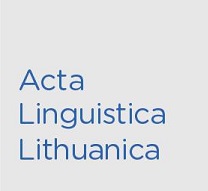Ätzend! Zur geschichte der verben ätzen, atzen, äsen
Ätzend! On the History of the Verbs “ätzen”, “atzen”, “äsen”
Author(s): Albrecht GreuleSubject(s): Syntax, Lexis, Semantics
Published by: Lietuvių Kalbos Institutas
Keywords: change of meaning; etymology; historical syntax; causativity; verbactant constellation;
Summary/Abstract: In German youth communication and colloquial language, ätzend is used as a pejorative for something that is boring, disgusting and unpleasant. However, etymologically speaking, Ätzen is the causative of essen. This article attempts to trace the development that led from the essen causative, Germanic *atjan, present in the Old Germanic languages, to the New High German verbs ätzen, atzen and äsen, which are still listed in the 2007 German Dictionary (DWB). The hypothesis that verb change cannot be grasped without describing the morphological and semantic environment of each verb is observed.
Journal: Acta Linguistica Lithuanica
- Issue Year: 2021
- Issue No: 84
- Page Range: 11-29
- Page Count: 19
- Language: German

